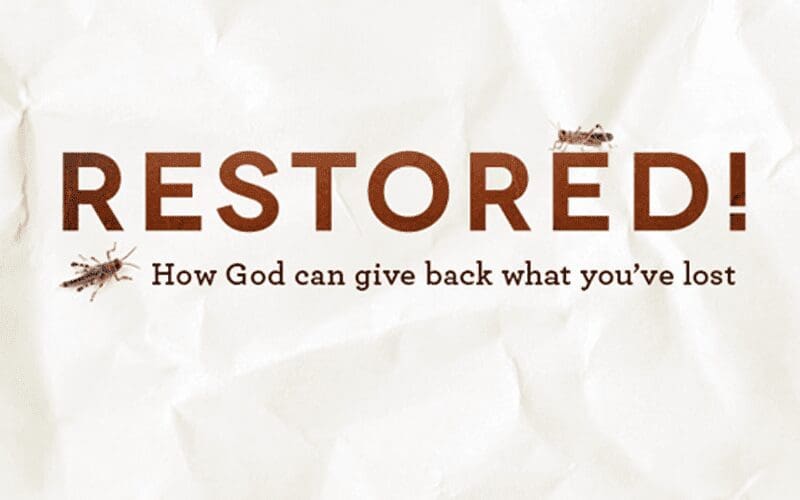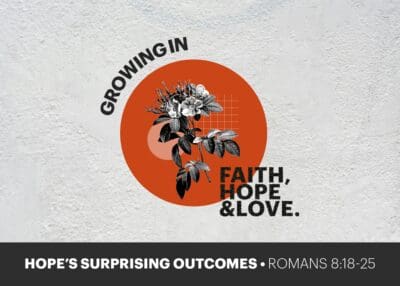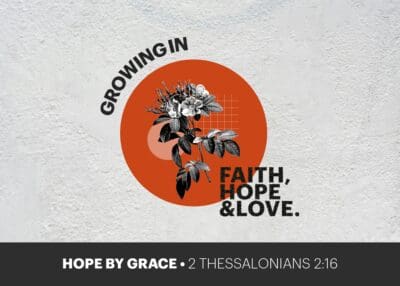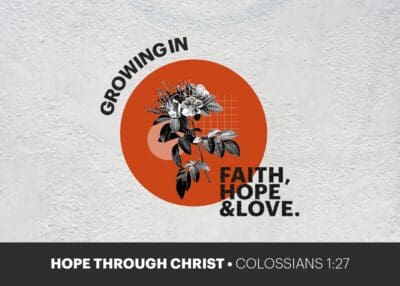I will restore to you the years that the swarming locust has eaten. Joel 2:25
I invite you to open your Bible at the book of Joel. I’ve never preached a series on the book of Joel, but last year, I camped on it for a while in my own private times of prayer and reading. God used it in my life and my prayer is that he will use it in yours as well.
We try to take the Bible seriously in this church. We believe that whatever God says, we need to hear. So we try to cover all of the Bible’s parts over time and with a sense of proportion. It has been some time since we’ve been in the minor prophets, so this is where we are for this month.
The first thing to say about Joel is that it is a book full of hope. The key word is “restore.” God says “I will restore to you the years that the swarming locust has eaten” (Joel 2:25). So the title for this series is: Restored! How God can Give Back What You’ve Lost.
Today, I want to give a quick overview of the first half of this book and then we will focus in on the call to “turn to God with all of our hearts.”
The Day of the Locusts
The word of the Lord that came to Joel, the son of Pethuel. Joel 1:1
We don’t know much about Joel, except for the name of his father. Where and when he lived are not recorded. What matters is that the Word of the Lord came to Him. And God’s Word speaks to every time and place.
God spoke through Joel because an unprecedented disaster had come on the Promised Land: “Has such a thing happened in your days or in the days of your fathers” (Joel 1:2)? This was such a calamity that Joel says people will tell it to their children, and to their grandchildren, and even the great grandchildren will hear about it.
Tells us what it was: “What the cutting locust left, the swarming locust has eaten. What the swarming locust left, the hopping locust has eaten, and what the hopping locust left, the destroying locust has eaten” (Joel 1:4). The locust was an insect rather like the grasshopper. It was a harmless little bug, but when they came in swarms, they could be devastating. And what Joel describes here is a locust epidemic.
An article in National Geographic magazine years ago describes a locust invasion: “They came in enormous numbers, settling on the fields and hillsides. There they laid their eggs in vast numbers… Some 60,000 could come from eggs planted in 39 square inches of soil… Once hatched, the new broods started crawling across the ground, at a rate of 400 to 600 feet per day, devouring every scrap of vegetation in their path.”
Picture a corn field with broad green leaves and swelling cobs. A vast army of insects advances over the field. When they’re finished with a stalk of corn, nothing remains, but a dead stalk in the ground. These insects are advancing at such a speed that you can see the field disappearing before your eyes. The next day, the locust army advances to the next field. Where the earth is exposed they dig holes and lay their eggs. And after a few weeks another 60,000 locusts rise up from every hole.
Imagine this epidemic coming to our country before the advance of pesticides. Think about the corn fields of Illinois, Indiana, Iowa, Kansas and beyond. Mile upon mile of healthy crops. Now picture a map showing the “locust line” moving forward across each state. Behind the line, the crops are completely gone.
Joel describes the locusts in four ways: 1) The cutting locust, 2) the swarming locust, 3) the hopping locust, and 4) the destroying locust. These could be descriptions of the locust at various stages of its development, but I think it more likely that these descriptions point to four years in which the crops were devastated by the insects. I say that because of God’s promise to restore “the years” the locusts have eaten.
The effect of this plague of locusts is devastating. It devastates the land: “The fields are destroyed, the ground mourns, because the grain is destroyed, the wine dries up, the oil languishes” (Joel 1:10).
It devastates the animals: “How the beasts groan! The herds of cattle are perplexed because there is no pasture for them; even the flocks of sheep suffer” (Joel 1:18).
It devastates the people: “Pomegranate, palm, and apple, all the trees of the field are dried up, and gladness dries up from the children of man” (Joel 1:12). You go across the land and you don’t find happy people. In the third and fourth year of the epidemic they were trying to survive.
The loss touched the Lord: “It has laid waste my vine and splintered my fig tree” (Joel 1:7). The vine that has been laid waste is God’s vine. The fig tree that has been splintered is God’s fig tree.
The Promised Land belongs to the Lord and the first fruits of the land are to be offered to him. How can there be a grain offering if there is no grain? “The grain offering and the drink offering are cut off from the house of the Lord. The priests mourn, the ministers of the Lord…” (Joel 1:9).
This is an absolute national disaster. How are God’s people to respond to disaster? Not just this disaster, but any disaster? What are we to do when we see war and violence sweeping like an army of locusts across the Middle East? What are we to do when an invasion of drugs is sweeping across the United States of America like a plague of locusts destroying the lives, not of plants but of people?
What are we to do when we see—like an army—shallowness and unfaithfulness sweeping in like a plague of locusts, stripping the church of vibrant faith and cutting out the life of costly obedience? The answer is in verse 13…
The Call to Lament
Put on sackcloth and lament, O priests; wail, O ministers of the altar. Go in, pass the night in sackcloth, O ministers of my God! Joel 1:13
Earlier this summer, I had the opportunity of attending the Evangelical Free Church conference in New Orleans. There were many good things in the conference, and one of them was a lecture from Professor Dennis Magary (from Trinity International University) on the psalms of lament.
He began by pointing to the massive change that is going in our culture. Godlessness is sweeping over the land at an astonishing speed. He said “People want to do something about it, and they don’t know what to do.”
Here’s the problem: “We don’t know how to lament. Christians who have been brought up on a diet of ‘you’re great and God’s good, so everything will be just fine’ have nothing to say in a suffering world.” Magary said to the pastors gathered before him, “We need to learn how to lament, and then we need to teach God’s people to do the same.”
That’s exactly what Joel says here. It has to begin with the ministers: “Put on sackcloth and lament, O priests; wail, O ministers of the altar” (Joel 1:13). These people are vocationally employed. They serve in the temple. Then it extends to the people who are most spiritually mature – the elders, “Consecrate a fast; call a solemn assembly. Gather the elders…” (Joel 1:14). Then it spreads to all the people, “Gather the elders and all the inhabitants of the land to the house of the Lord your God” (Joel 1:14).
What do we know about lamenting? Where do we do that? In a culture where everything is geared to giving you a feel good church experience, how do Christian people learn to lament? The church ends up turning a blind eye to the needs of the world. Public prayer gets reduced to thanking God for all the wonderful blessings we have in our lives. And the world says, “This is supremely irrelevant.” When do the people of God cry out to him for mercy on our land?
The church is a place for people who are ready to become serious about following Jesus. Do you remember that Jesus knelt down and he wept over Jerusalem? He knew what it was to lament. If we are his people, we need to learn that too. We dare not simply talk about these things. We must do them.
Earlier this summer I spoke about the depth of our praying. I mentioned then that in the fall we would establish a regular gathering for prayer at every campus of the Orchard. That begins this week. On the first week of every month, there will be a gathering for prayer at each campus. At Arlington Heights, Itasca, and Marengo it will be on the first Wednesday of the month. At Barrington it will be on the first Thursday of the month.
Joel says, “Gather the elders and all the inhabitants of the land to the house of the Lord your God and cry out to the Lord.” We have an opportunity to do that this week, and to lament and then to repent.
Our prayer will include the immediate ministry needs of your campus, as well as for the life of the church and the needs of the world. I hope you will come and join with others as we try to put what God says to us into practice, so that the Bible is actually informing how we live.
The Day of the Lord
To you, O Lord, I call. For fire has devoured the pastures of the wilderness, and flame has burned all the trees of the field. Joel 1:19
From verse 19 onward, we have a new and different picture. Locusts ate the vegetation, they did not burn it. Joel is now moving beyond the disastrous epidemic that ruined the crops to speak of something else: “The day of the Lord is coming, it is near” (Joel 2:1).
Joel describes “the day of the Lord,” a vast army moving into the land. Like the plague of locusts, this army sweeps across the land burning everything in its path: “Fire devours before them, and behind them a flame burns” (Joel 1:3).
Isaiah spoke of how God would make the wilderness like Eden (Isaiah 51:3). Here we have the opposite: “The land is like the garden of Eden before them, but behind them a desolate wilderness, and nothing escapes them” (Joel 1:3).
The effect of this army on the people is sheer terror: “Before them peoples are in anguish; all faces grow pale” (Joel 1:6). It’s not just the people who are terrified. On the day of the Lord “the earth quakes before them; the heavens tremble. The sun and the moon are darkened, and the stars withdraw their shining” (Joel 1:10).
The day of the locusts led Joel to speak about the day of the Lord: “The Lord utters his voice before his army, for his camp is exceedingly great; he who executes his word is powerful. For the day of the Lord is great and very awesome; who can endure it” (Joel 1:11)?
If we can’t endure two-inch insects, how would we ever endure if God were our enemy? In the light of this day, God calls his people to repent.
The Call to Repent
“Yet even now,” declares the Lord, “return to me with all your heart.” Joel 1:12
Every disaster brings a call to repent. Every disaster is a reminder that this world will end. God will roll it up like a scroll.
Luke records an occasion when some people told our Lord about an unspeakable atrocity that had taken place: Herod, who was a wicked king, had launched an attack on some people from Galilee while they were in the act of worship, offering sacrifices to God. Pilate mingled the blood of these people with their sacrifices (Luke 13:1). It was an unspeakable atrocity. How in the world could a ruler do such a thing to his own people?
That is exactly the question that is on everyone’s mind today, as we see evidence of a gas attack of horrific proportions on men, women, and children in Syria. How could such an atrocity take place and what should be done about it? That was the question they were bringing to Jesus—a question, by the way, that should cause us to pray for those in leadership who are responsible for these decisions.
Jesus’ response is one of the most astonishing things that our Savior ever said: “I tell you, unless you repent, you will all likewise perish” (Luke 13:3). Every disaster brings a call to lament and repent for God’s people.
Who should repent?
Blow the trumpet in Zion; consecrate a fast; call a solemn assembly; gather the people. Consecrate the congregation; assemble the elders; gather the children, even nursing infants. Let the bridegroom leave his room, and the bride her chamber… Joel 1:15
This is a call to the entire community of God’s people to repent: The congregation, the elders, the children, even the very young, and the newly married and the about to be married.
Who needs to repent first?
It’s very easy for Christian people to say that the nation needs to repent. But repentance begins with those who know God. It begins with those who believe. And among God’s people it begins first with those who are most spiritually mature, which is why Joel speaks about the elders.
I recently came across a striking statistic: 15 years ago the percentage of Americans who regularly worship in church was about a third (34%). Today, the figure is about half that—just 17%. We have moved from one in three to one in six worshippers in 15 years. Where does repentance need to begin? Is it with those who left? No, it is with us who are still here.
A.W. Tozer in his book The Pursuit of God described how Christianity in America was gradually being emaciated: “Faith that trusts God has been replaced by bare belief… Christianity has been relieved of repentance, obedience, and cross carrying…”
We will not see a repentant nation until we have a repenting church. Repentance and faith are like two sides of the same coin: All who truly believe repent, and all who truly repent believe. That’s how you know a true Christian.
How can we repent?
Return to the Lord, your God, for he is gracious and merciful, slow to anger, and abounding in steadfast love; and he relents over disaster. Joel 1:13
Here are 5 reasons for returning to the Lord:
- He is gracious: Grace means he does not treat us as we deserve.
- He is merciful: He has pity. He has compassion on us in our need.
- He is slow to anger: The day of the Lord has not yet come. The way of access to God is open. God is ready and willing for you to be reconciled to him for Christ’s sake.
- He is abounding in steadfast love.
- He relents over disaster.
People don’t repent because someone tells them that what they are doing is wrong. People repent when they see that God is good.
“The day of the Lord is great and very awesome; who can endure it?” The question remains unanswered in the Old Testament, but it is answered in the New Testament. Who can endure the day of the Lord? No one can.
But then one man did! One man did endure the Day of the Lord. All the judgment that was due to sinners was poured out on him. He endured it. He absorbed it. That man was God himself. God in the flesh. God with us and God for us. God was, in Jesus Christ, reconciling us to himself.
Through Jesus Christ, God offers you grace, mercy, and steadfast love. Today he says to you: “Return to me, with all your heart. And if you will follow me, there is no condemnation for those who are in Christ Jesus.”
When should we repent?
“Yet even now,” declares the Lord, “return to me with all your heart.” Joel 1:12
Now at the height of your trouble, while you are still in your sin, while you feel ashamed and unworthy… even now, declares the Lord, return to me with all your heart. And you will be embraced with steadfast love.





